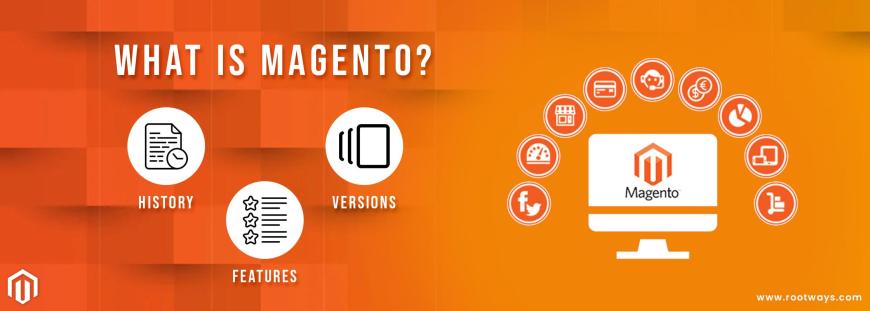
What is Magento? - History, Versions, Features
Magento is an open-source platform with built-in PHP for developing web applications. It was released on 31st March 2008 by Varien and set on Zend Framework. Many businesses are using this open-source platform to start their online store, including big ones like Nike, Tommy Hilfiger, Coca Cola, Samsung, etc.
In addition, Magento 2 is a better and faster version of Magento. Magento 2 was released as its successor to fulfill the rising demands of the businesses. Magento 2 is the latest version of the e-commerce software from the Magento family, which aims to improve the speed and performance provided by various other high-level features and thus improve conversion rates for online stores.
Why use Magento 2?
Magento 2 is the best shopping cart solution for business owners. It delivers a wide range of adjustable tools that make it a more useful platform for your online stores. With the help of Magento 2, you can easily manage your store’s looks, content, and functionalities.
Following are a few of the detailed points which would help you in deciding why Magento 2 is more suitable as an option for an e-commerce platform:
- Advanced scalability and performance:
Magento 2 has proved to be 20% faster than Magento 1. In addition, the usage of AJAX allows consumers to add products to their cart without having to reload the page. Also, the platform's full-page caching capability has shown to load pages much faster, making it scalable for even large-scale businesses. - Easier checkout process:
The checkout procedure in Magento 2 now consists of only two simple stages, allowing customers to have a better purchasing experience and reducing cart abandonment. It also allows for guest checkouts without requiring a login or registration. Also, once the buyer enters their destination address, the shipping charges are dynamically loaded. When compared to Magento 1, which had a six-step process, Magento 2 is sure to enhance conversion rates. - Highly Compatible:
Third-party tools and other popular extensions, such as payment gateways like PayPal and Braintree, are much easier to integrate with Magento 2 to improve your store's functionality. In addition, it is compatible with a variety of PHP frameworks, databases, and online cloud services, making it a hassle-free Magento development application. - Better admin interface
Magento 2 has a more user-friendly and accessible admin interface. In addition, it's very adaptable, and it's built to give administrators quick access to vital information and simple product administration. As a result, it saves time when maintaining an online store and is incredibly beneficial.
Overall, Magento 2 has a lot of effective capabilities that make advanced marketing, SEO, and catalog maintenance simple.
Adobe MagentoMagento Commerce was owned by Adobe in May 2018. Magento is a PHP-based online shop builder (eCommerce platform) that allows you to establish a business website and sell things online. It works similarly to other helpful online service providers such as Shopify, WooCommerce, WordPress, and Wix in that it creates a website for you to sell your products.Each of these platforms has its benefits, so your job is to go through them all and choose the one that best suits your company strategy, industry, needs, and desires.
WHAT CAN MAGENTO PROVIDE FOR YOU?
Magento's ecommerce platform is built on open source technology and a PHP framework, giving online store owners complete control over how their websites function and appearance and a customizable shopping cart system. Magento also includes marketing, SEO, and catalog management features. In addition, it has a wide range of themes and templates and thousands of extensions and customization options.
Customers can choose between two versions of Magento:
- Magento Open Source
- Magento Commerce
History of Magento
In August 2007, Developed by Roy Rubin and Yoav Kutner.
2008 - Magento Community edition
2009 - Magento Enterprize edition
2010 - Magento Professional edition
2011 - Announced Magento Developer Certification, And Paypal Integration
2012 - 2014 - 4 Million downloads, Supports PHP 5.4, Magento 1: Updates and Revised version
2015 - Magento 2 Beta version
2016 - Magento 2.1 Release, Magento Marketplace Launched, Magento commerce Cloud Released, Luma Theme Released
2017 - Magento Commerce, Magento 2.2 Release
2018 - Adobe Company, Magento 2.3 Release, Magento Payment announced
2019 - Released - Magento Commerce Cloud, Launched - Amazon Sales Channel in Magento
2020 - Magento 2.4 in August
2021 - Magento 13th Anniversary, Magento 2.4.3 Released
10 Features of Magento
- Improved Performance And Scalability
- Customer Persuasion
- Powerful Platform
- Magento 2 Is Mobile Friendly
- Advanced Seo Features
- A Huge Community
- Customisable Security Features
- Marketplace Integration
- Intelligent Search Options
- Limitless Customisation